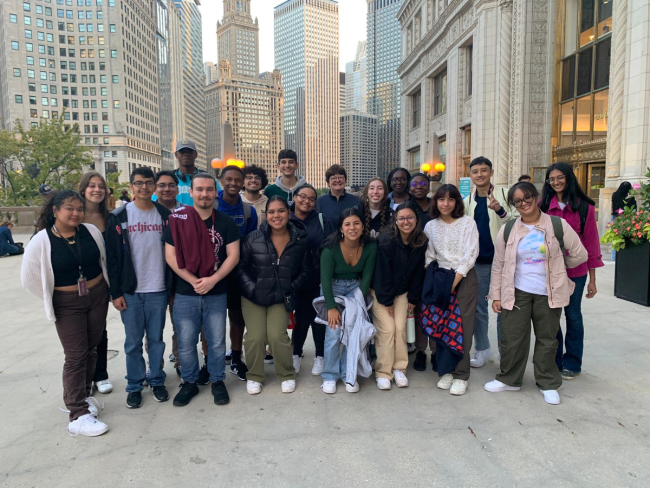You have /5 articles left.
Sign up for a free account or log in.

Twenty students from the University of Chicago are participating in this year’s Phoenix STEM program, an initiative to boost retention and graduation of diverse students interested in studying science, technology, engineering and math.
University of Chicago
Despite having similar levels of interest in science, technology, engineering and mathematics, students from underrepresented minority groups are less likely to earn degrees in those fields, and some are more likely to end up in debt.
A new program at the University of Chicago’s undergraduate college allows talented students interested in pursuing a career in STEM to engage with like-minded peers and receive wraparound supports, including mentorship, academic services and scholarship dollars to promote retention and student success. Phoenix STEM launched this fall and supports 20 first-year students at present.
“So many of these students come from backgrounds that are different from the mainstream students at the University of Chicago—they feel that they are isolated; they don’t believe, really, that they belong here,” explains program director Zsuzsanna Szaniszlo. “Having the cohort seeing people who are struggling in the same ways that they are, that’s very, very helpful.”
The background: The program is funded by a five-year grant from the Neubauer Family Foundation. NFF also allocated funding for a one-week summer program for 11th-grade students interested in STEM that covers tuition, room and board and round-trip transportation.
STEM is a challenging field for many students but particularly those who were underprepared in high school due to a lack of resources or were not given the opportunity to study at an accelerated rate, such as by taking AP courses, Szaniszlo says. The goal of Phoenix STEM is to assist talented and driven students by helping them get on equal footing with their more resourced peers and help them achieve their dreams.
How it works: Around 80 students were encouraged to apply for the program this fall, and over 40 did, with 20 admitted into Phoenix STEM for the 2023–24 academic year. A majority of students are first generation or from low-income families, and all are from diverse racial and ethnic backgrounds, Szaniszlo.
Applicants were evaluated on their commitment to STEM careers, and those who wanted to complete high levels of postsecondary education, including Ph.D.s or M.D.s, were considered over other candidates.
A special two-week pre-orientation program supported participants’ transition into the university, including meeting with their peers and professors and working through problem sets in mathematics, chemistry and biology. The boot camp also covered academic supports and themes such as impostor syndrome and how to find resources.
During the two weeks, students were given assignments and information at the same rate they might during the first week of the academic term, giving them a feeling for the pacing and rigor of their upcoming college experience, explains Szaniszlo.
Students met twice a month during the first term, which will reduce to around once per month in the second semester.
“We are encouraging them to turn to us every time they have an issue. Some do it better than others, but they have only been through the first quarter, so we hope that this will get better as we move along,” Szaniszlo says.
Each first-year student receives a stipend of around $200 each quarter to cover emergency expenses. Some students came to Chicago without winter coats or boots, for example, so staff took them shopping this term.
Grant funding, beyond covering the two-week boot camp at the start of the term, covers the student stipends and hiring of additional instructional faculty members to lead collaborative learning in mathematics, physics, computer science and biology.
What’s next: Starting next fall, the incoming cohort will double to around 40 students, which will be the standard admitted group for the next four years, until the end of the grant period.
There are no requirements or criteria for students to remain in the program other than a continued interest in STEM, but program staff hope students remain engaged and continue to seek help throughout their time at Chicago.
University staff will evaluate the program based on success metrics including academic performance compared to their peers who did not participate in the program, as well as student confidence, feelings of belonging and their career goals.
If your student success program has a unique feature or twist, we’d like to know about it. Click here to submit.




